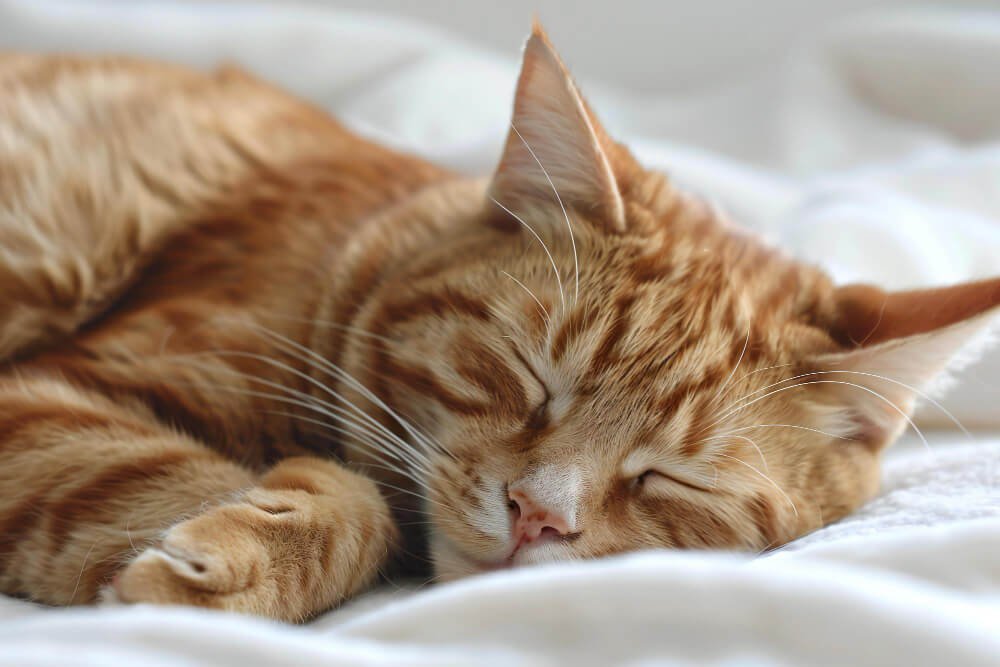If you’ve ever watched a cat sleep, you may have noticed twitching whiskers, tiny paw movements, or even an occasional muffled meow. These adorable moments have left many cat owners wondering: Do cats dream? And if they do, what fills their dream worlds? Cats, like humans, experience a series of sleep stages, each providing unique insights into their behavior, mood, and well-being. Let’s dive deep into the fascinating realm of feline sleep to uncover if cats dream, why they dream, and how we might better understand these remarkable creatures’ sleep habits.
Understanding Feline Sleep Cycles
Cats are known for their love of sleep, typically spending anywhere between 12 to 16 hours snoozing each day. But unlike humans, who usually sleep in one long stretch, cats are crepuscular, meaning they are most active at dawn and dusk. During their sleep, cats go through various stages that closely resemble human sleep patterns.
Cat Sleep Stages
- NREM (Non-Rapid Eye Movement): During this phase, cats sleep deeply but are not actively dreaming. This restful sleep is vital for muscle repair and bodily recovery.
- REM (Rapid Eye Movement): This phase is where things get interesting. In REM sleep, the brain becomes active, and this is when scientists believe that cats, like humans, are most likely to dream.
 Do Cats Dream During REM Sleep?
Do Cats Dream During REM Sleep?
Research on feline sleep patterns indicates that cats likely do dream, especially during REM sleep. Dr. Nicholas Dodman, a veterinary behaviorist, suggests that cats exhibit similar brainwave patterns to humans while in REM sleep, leading experts to believe that cats might experience dreams during this stage.
In fact, many pet owners notice their cats twitching, moving their paws, or even making sounds while asleep. These behaviors are likely signs of dreaming, suggesting that the cat may be reliving a recent experience, chasing a mouse, or exploring a familiar environment. REM sleep, essential for emotional processing, is also believed to aid in memory consolidation for cats.
What Do Cats Dream About?
It’s impossible to know precisely what a cat dreams of, but experts believe their dreams likely involve daily activities and common experiences, such as:
- Chasing Prey: As natural hunters, it’s likely that cats dream of chasing or stalking prey.
- Exploring: Cats have an instinct for exploration, so they may dream of climbing, wandering, or even interacting with other animals.
- Interactions with Humans: For domesticated cats, dreams may include moments of affection or play with their favorite humans.
Cats’ dreams likely reflect their unique personalities, so an active and playful cat may have vivid, adventurous dreams, while a more sedentary feline might dream of curling up in cozy spots.
How Much Sleep Do Cats Need?
Cats are champion sleepers, clocking in anywhere between 12 to 16 hours a day, with kittens and older cats needing even more. While cats are known for sleeping long hours, they rarely reach deep sleep stages. Instead, they engage in polyphasic sleep, sleeping for shorter durations multiple times throughout the day. This polyphasic pattern helps them stay alert, as their wild ancestors needed to be ready for any surprise prey—or danger.
If your cat is sleeping more than usual or showing signs of lethargy, it may be a good idea to consult a veterinarian. While it’s normal for cats to sleep extensively, drastic changes in sleep patterns can be an indicator of health issues.
Can You Improve Your Cat’s Sleep?
Providing a comfortable and safe environment can help your cat achieve restful sleep. Consider these additions to your home:
Cozy Cat Beds
Give your feline a place to curl up with a Cozy Cat Bed that’s both soft and secure, mimicking the warmth and comfort they seek during sleep.
Elevated Perches
Cats love to sleep high up where they can feel safe and observe their surroundings. An Elevated Cat Perch or Cat Tree can serve as a perfect spot for a deep slumber.
Calming Products
For anxious cats, consider trying a cat calming diffuser to help them relax and enjoy a deeper sleep.
Do Cats Have Nightmares?
Cats experience the world vividly, so they may indeed have nightmares, just like humans. While it’s difficult to determine precisely what might cause a nightmare for a cat, common triggers could include:
- Past Trauma: Cats with a history of abuse or difficult experiences might relive these moments in their dreams.
- Threats: As prey animals in the wild, cats naturally have a heightened sense of caution, which could lead to dreams about potential threats.
Owners occasionally report hearing distressed sounds or noticing their cat wake up abruptly. While this may be a response to a nightmare, it’s generally a good idea to let the cat calm down on its own unless the behavior seems excessive.
Why Is REM Sleep Important for Cats?
REM sleep is essential for maintaining both physical and mental health in cats. This sleep stage is believed to:
- Help with Memory Retention: Cats rely on memory for hunting skills and familiarizing themselves with their environment.
- Aid in Emotional Processing: REM sleep supports cats in managing emotional experiences, just as it does in humans.
- Support Physical Health: Quality sleep allows the body to repair muscles and tissues, making it crucial for active cats.
The importance of REM sleep extends beyond physical health; it plays a role in helping cats adapt to new environments, socialize, and retain learned behaviors.
Cat Dreams: Myth or Reality?
The question of whether cats dream is often met with both curiosity and skepticism. Scientific research supports the idea that cats do dream during REM sleep, showing brain activity that mirrors human dreaming patterns. Although we can’t see into a cat’s mind, their behaviors—like twitching and vocalizing—strongly suggest they experience dreamlike states.
Tips for a Dream-Friendly Environment
Want to help your cat dream peacefully? Here are some ways to create a cozy and dream-friendly sleep space:
- Dedicated Cat Space: Provide a quiet, safe area where your cat can relax and feel secure.
- Comfortable Bedding: Use Memory Foam Cat Beds or fluffy blankets for ultimate comfort.
- Routine Playtime: Engage in interactive play sessions to ensure your cat expends energy before winding down for sleep.
- Regular Feeding Schedule: Cats are creatures of habit, so a consistent routine can help regulate sleep.
Final Thoughts: Embracing the Mystery of Cat Dreams
Although we may never know precisely what cats dream about, the evidence overwhelmingly suggests that they do dream. With sleep playing a critical role in a cat’s well-being, understanding the nuances of feline sleep can help us create more fulfilling, healthy lives for our furry friends. So, the next time you catch your cat’s paw twitching or see their ears perk up while they snooze, you might just be witnessing a glimpse into their own dream world.
FAQs
Do cats really dream?
Yes, evidence suggests that cats experience dreams, especially during REM sleep.
What do cats dream about?
Cats likely dream of familiar experiences like chasing prey, exploring, or interacting with humans.
Do cats have nightmares?
Yes, cats can have nightmares, often related to past trauma or perceived threats.
How much sleep do cats need daily?
Most cats sleep between 12 to 16 hours per day, with kittens and older cats needing more rest.
How can I improve my cat’s sleep quality?
Provide a comfortable bed, reduce noise, and maintain a consistent routine to promote quality sleep for your cat.
Why do cats sleep so much?
Cats are naturally wired for long hours of rest to conserve energy, as they are instinctively hunters, even if they don’t hunt.

